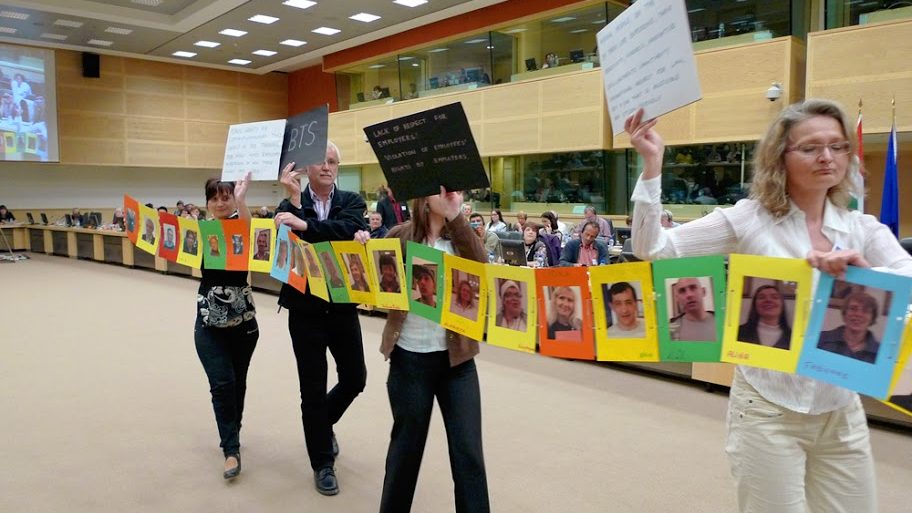-
Establishment of the EAPN Fund:
This fund, with the support of the King Badouin Foundation (KBF), has as main objectives:
- Ensuring the development of EAPN and its National Networksas a strong alliance of anti-poverty NGOs.
- Supporting the anti-poverty workof EAPN to increase the impact of participation of people experiencing poverty in all matters and policies that affect them and the communities in which they live.
- Awarding a biennial Prize for Innovation from Transnational Learningin the fight against poverty and social exclusion in Europe.
-
1st Annual Convention for Growth and Inclusion:
This Annual Convention replaced the previous Round Tables for Social Inclusion. Again, although with a totally different focus and reduced ambition, the idea was to gather a broad number of stakeholders around the progress of implementation of the Europe 2020 strategy. The model of organisation in the beginning was quite similar to the Round Tables. The first one tool place in Cracow (2011) but afterwards the EC decided to organise all the conventions in Brussels. EAPN continued to be a major stakeholder involved, but since 2013, the model or organisation (namely the time spent for the Convention) and the way it was prepared reduce quite significantly the space for the participation of NGO’s and a preponderance has been given to the biggest platforms and federations. On the other hand, with the end of a clear open method of coordination and the difficulty of civil society to engage in the Europe 2020 process, namely the Semester, the EC reduced the impetus on the recommendation for a big participation of NGO’s, particularly those more close to the ground. The impact was that it became more difficult for the national networks to get engaged and participate. On the other hand, giving a thematic focus to the Conventions, not related with an overall monitoring of the 2020 strategy demotivated a stronger and meaningful participation of NGO’s.
-
10th European Meeting of People Experiencing Poverty:
“Employment, Work, Jobs – the reality for people experiencing poverty”Organised by the Hungarian Presidency of the European Union, with the support of the European Commission and of the European Anti-Poverty Network, the 10th European Meeting of People experiencing poverty took place at the Palais d’Egmont in Brussels, on 14-15 May.
-
23rd GA – Lisbon (Portugal):
This GA, under the theme “Europe needs a new heart” was organised together with a campaign with the same name. A photographic exhibition took place involving 24 EU photographers (professionals and amateurs) trying to transmit a visual image of the concept. Video here: https://youtu.be/YFxrYJrrh-c
-
National Reform Programmes & European Semester:
National Reform Programmes (NRPs) are documents issued by EU Member States to the European Commission on an annual basis (since 2011), detailing the specific policies they will implement to boost jobs and growth and prevent/correct imbalances, and their concrete plans to comply with the EU’s country-specific recommendations and general fiscal rules. NRPs are key instruments in the EU’s European Semester process, which is a cycle of economic and fiscal policy coordination within the EU and part of the European Union’s economic governance framework. The NRPs are based on the European Commission’s Broad Economic Policy Guidelines, which set out common priorities and targets for national employment policies. The Commission’s Employment Guidelines are intrinsically linked to the economic guidelines: together, they form the integrated guidelines that underpin the Europe 2020strategy for smart, sustainable and inclusive growth. Under the European Semester, each Member State submits their NRPs each April. The Commission in May assesses the NRPs. In June, the Commission provides country-specific recommendations to Member States as appropriate, which are discussed and then formally adopted by the Council in July. All this work is closely monitored by EAPN through the EUISG.
-
European Year of Volunteering:
Objectives of the Year: The EU will use the Year to work towards four main objectives:
1. To create an enabling and facilitating environment for volunteering in the EU;
2. To empower volunteer organisations and improve the quality of volunteering;
3. To reward and recognise volunteering activities; and
4. To raise awareness of the value and importance of volunteering.



